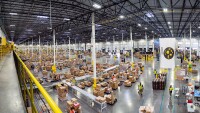When customers are shopping on the Amazon Store and learn that a product is out of stock, how likely are they to replace it with a similar product from a different brand? What are the fastest, most fuel-efficient routes to deliver orders to customers?
If we claim to be working on real-world problems, it’s important to actually go out there and work on these problems, to ground research in reality.
These are among the questions that Chamsi Hssaine and Hanzhang Qin, the inaugural postdoctoral scientists with the Amazon Supply Chain Optimization Technologies (SCOT) team, explored when they entered the Amazon Postdoctoral Science Program in 2022. The program provides PhD graduates with an opportunity to gain industry experience, apply their subject matter expertise, and learn from Amazon scientists.
“If we claim to be working on real-world problems, it’s important to actually go out there and work on these problems, to ground research in reality,” said Hssaine, who received a PhD in operations research at Cornell University and recently joined the Data Sciences and Operations Department at the University of Southern California’s Marshall School of Business as an assistant professor.
Qin received a PhD in computational science and engineering from the Massachusetts Institute of Technology and will be an assistant professor at the National University of Singapore’s Department of Industrial Systems Engineering and Management this fall. He said the postdoctoral science program at Amazon opened his eyes to the landscape of real-world supply chain problems yet to be solved.
“You cannot get a real sense of these problems if you only read papers and articles talking about them,” he said. “When I got into this business and could see the datasets describing these problems, I realized that there are still many very important problems in supply chain management and transportation.”
Fostering collaboration with postdocs at Amazon
The Amazon Postdoctoral Science Program is a natural evolution of the company’s efforts to engage with the academic community to facilitate an exchange of ideas between academia and Amazon “without causing a brain drain from universities,” explained Salal Humair, a vice president and distinguished scientist in SCOT who was Qin's manager.
This engagement started with the Amazon Scholars program, which allows tenured and high-profile academics to join Amazon in a flexible capacity such as a part-time arrangement. The program expanded to Amazon Visiting Academics for pre-tenured or early-tenure academics who seek to apply research methods to complex technical challenges while continuing their university work. The Postdoctoral Science Program engages early-career academics.
“Having top young talent spend a year at Amazon before embarking on their academic careers is a great way of building relationships with the next generation of academic leaders,” said Garrett van Ryzin, a distinguished scientist on the SCOT team who was Hssaine’s manager. “These are early days,” he added, “but I have confidence that it’s going to be very valuable.”
Operations research and optimization
The field of operations and optimization research was unknown to both Hssaine, who grew up in Los Angeles, and Qin, who grew up in China, until they entered university. But both loved numbers and gravitated toward math and computer science courses in college. There, they both discovered operations research aligned with their individual interests.

“It was the first time that I realized you could set up really elegant mathematical models to solve real-world problems,” said Hssaine, who learned about the field during an introductory engineering course while an undergrad at Princeton University. “That really spoke to me.”
She majored in operations research and financial engineering at Princeton and attended graduate school at Cornell University. Her thesis focused “on algorithm and incentive design for smart societal systems,” she said. “In particular, my research incorporates more-realistic models of behavior under incentives and seeks to understand the effects of policy decisions.”
For example, one project explored the intersection between how customers decide where to buy certain products and how companies price those products.
“There’s a wide variety of ways in which customers make decisions between company A and company B. My work tries to understand how various assumptions on customer behavior impact this sort of pricing decision in a competitive landscape,” she said.

Qin majored in mathematics and industrial engineering at Tsinghua University in Beijing. As part of those studies, he was exposed to operations research and maintained a focus on it while at MIT, where he received a master’s in electrical engineering and computer science and a second master’s in transportation.
He then pursued a PhD in computational science and engineering with a primary focus on areas of operations research that use statistics and probability to navigate uncertainty.
For example, one area of his research at MIT focused on developing a joint pricing and inventory control system for times when demand is uncertain. Another interest was in developing routes for delivery vehicles before the demand is known.
“When planning routes in advance, some of the routes of some drivers are intentionally overlapped so that they can help each other and coordinate on these overlap routes,” Qin said. He studied the value of this overlapping in routes, finding “a very little amount of overlap can significantly enhance the performance of the system.”
Postdoctoral science
As they wrapped up their PhD research, both Hssaine and Qin secured tenure-track positions in academia. Yet both elected to postpone their appointments for a year to gain industry experience.
“Amazon in particular seemed like a natural fit for my research because of the opportunity to apply my methodological toolbox to SCOT’s rich problem space,” Hssaine said. “And Amazon had been on my radar because I did an internship at Amazon during my third year of PhD.”
Hssaine’s main project is on inbound optimization — coordinating where vendors and sellers send their products into the Amazon network. This involved building models that explore, among other details, the tradeoffs between metrics such as the closest warehouse to the seller or vendor and the levels of congestion at those warehouses.
For example, if the warehouse closest to the vendor is congested, the congestion could cause delays getting the product to a customer. Sending a shipment to a congested warehouse will also have knock-on effects for other products and customers.
“When you’re thinking about where to send a shipment, you’re not just thinking about the cost that it itself incurs but the cost that it’s imposing on the rest of the system,” Hssaine said.
This research required finding data that is often hidden from plain sight, noted van Ryzin. For example, there is not a long queue of trucks at warehouses that signals congestion. Rather, sellers schedule delivery appointments, and congestion means the next available appointment may be the following week. It shows up as appointment delay.
“She had to do a lot of digging around to figure out whether the queue was really there, where it was manifesting, and do we even have visibility on how bad these appointment delays are getting,” van Ryzin said.
Qin’s research at Amazon, under Humair, took two tracks. One explored ways to improve the algorithms used to sell excess inventory through multiple channels such as markdowns on the Amazon Store and targeted advertising on other websites.
“This is a relatively unmodeled area within operations research,” noted Humair. “There are multiple ways we can make the products more attractive.”
In a second project, Qin applied his PhD research in planning efficient ways to procure, store and route inventory to customers. The preliminary research specifically focused on modelling tradeoffs between carbon emissions, inventory levels at fulfillment centers, and delivery routes and may eventually inform the company’s progress toward its Climate Pledge goal.
Qin presented his delivery route planning research at the SIAM Conference on Optimization in Seattle this spring. Hssaine presented her work on inbound optimization at the same conference.
Back to academia
As Hssaine and Qin enter the next phase of their careers in academia, they’ll build on the research conducted over the past year at Amazon, taking into account what they have learned about the types of questions that decision makers need answered.
“As academics, we can be quite divorced from that,” Hssaine said. “Even though what I’ve worked on at Amazon is related to the kinds of things that I was thinking about at Cornell, it’s allowed me to see a much broader range of problems.”
Qin, who has worked with several companies throughout his academic career, will take with him a newfound appreciation for Amazon’s “bias for action” leadership principle valuing speed in business.
“It’s much more efficient,” he said of doing research at Amazon. “This experience has helped me get comfortable with the faster pace of work.”
Humair and van Ryzin anticipate the exchange of ideas with their first class of Amazon postdoctoral scientists will continue as they start their careers in academia. Both Qin and Hssaine, for example, are working on research papers with colleagues from Amazon.
More broadly, Humair believes the fellowship experience will help Qin and Hssaine focus their academic research on topics that have real-world impact.
“As academics, you have a great deal of flexibility on what you choose to work on,” he said. “What I hope they take away is the judgment on what are truly important problems to work on.”






















